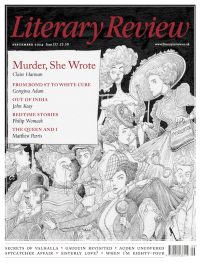Stuart Jeffries
I, Algorithm
Nexus: A Brief History of Information Networks from the Stone Age to AI
By Yuval Noah Harari
Fern Press 528pp £28
One day in 2013, police sped through the streets of La Crosse, Wisconsin, in pursuit of a car involved in a drive-by shooting. Once arrested, the driver, Eric Loomis, denied participating in the shooting. Later, he admitted to the minor offences of attempting to flee a traffic officer and driving without the car owner’s consent.
What was noteworthy about the case was that the judge sentenced Loomis to six years in prison for these offences after the defendant had been subjected to a COMPAS algorithmic assessment, which evaluated that the risk of him committing future crimes was high. COMPAS – which stands for ‘correctional offender management profiling for alternative sanctions’ – has since been used by courts in several US states. It involves asking suspects 137 questions (including about their criminal history, their association with criminal gangs and whether they agree with the proposition ‘A hungry person has a right to steal’). From the responses, an algorithm determines a suspect’s likelihood of reoffending. In Philip K Dick’s 1956 novella The Minority Report, psychics called precogs have foresight of future crimes; the information they provide is used by cops to apprehend and even terminate those likely to offend. Not dissimilarly, COMPAS recommends punishing more harshly those convicted of a first crime on the grounds that they seem likely to commit further crimes in the future.
Yuval Noah Harari cites this case in his always rewarding, often alarming book to articulate his fears about the rise of AI, a phenomenon he’s so concerned about that he thinks of it as ‘alien intelligence’. He believes that by amassing and processing more information than humans ever could, AI

Sign Up to our newsletter
Receive free articles, highlights from the archive, news, details of prizes, and much more.@Lit_Review
Follow Literary Review on Twitter
Twitter Feed
The latest volume of T S Eliot’s letters, covering 1942–44, reveals a constant stream of correspondence. By contrast, his poetic output was negligible.
Robert Crawford ponders if Eliot the poet was beginning to be left behind.
Robert Crawford - Advice to Poets
Robert Crawford: Advice to Poets - The Letters of T S Eliot, Volume 10: 1942–1944 by Valerie Eliot & John Haffenden (edd)
literaryreview.co.uk
What a treat to see CLODIA @Lit_Review this holiday!
"[Boin] has succeeded in embedding Clodia in a much less hostile environment than the one in which she found herself in Ciceronian Rome. She emerges as intelligent, lively, decisive and strong-willed.”
Daisy Dunn - O, Lesbia!
Daisy Dunn: O, Lesbia! - Clodia of Rome: Champion of the Republic by Douglas Boin
literaryreview.co.uk
‘A fascinating mixture of travelogue, micro-history and personal reflection.’
Read the review of @Civil_War_Spain’s Travels Through the Spanish Civil War in @Lit_Review👇
John Foot - Grave Matters
John Foot: Grave Matters - Travels Through the Spanish Civil War by Nick Lloyd; El Generalísimo: Franco – Power...
literaryreview.co.uk